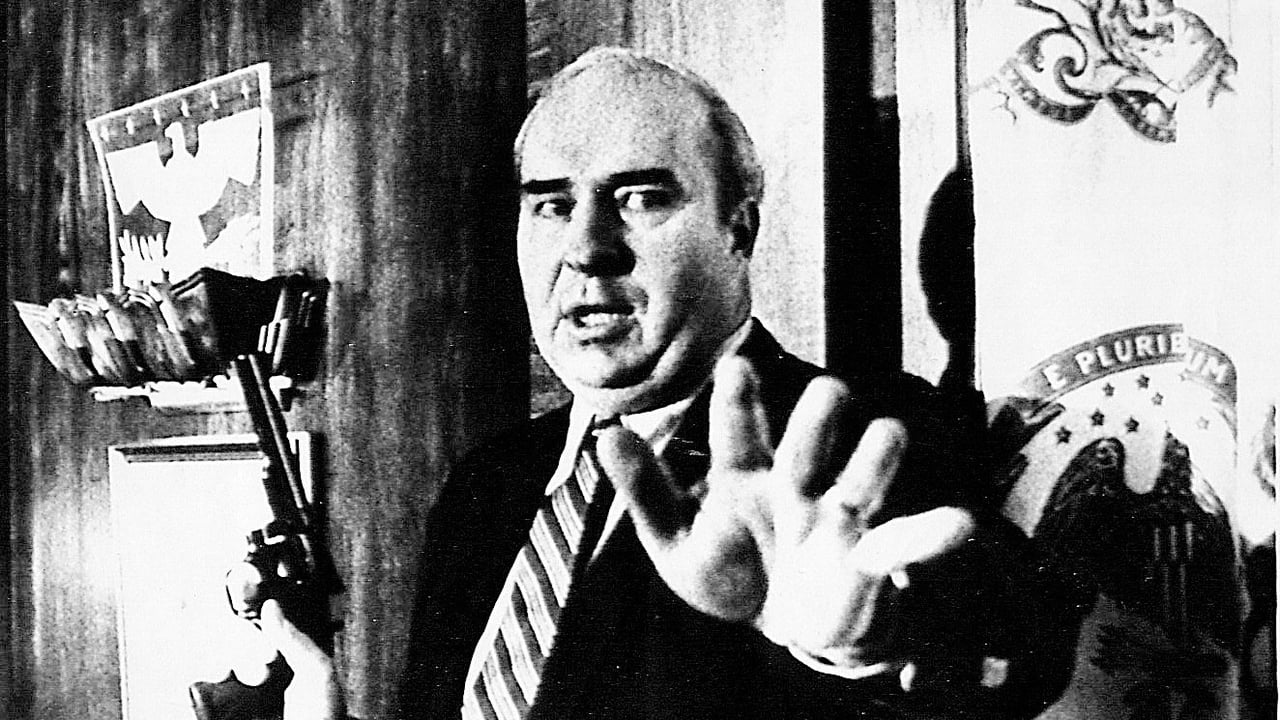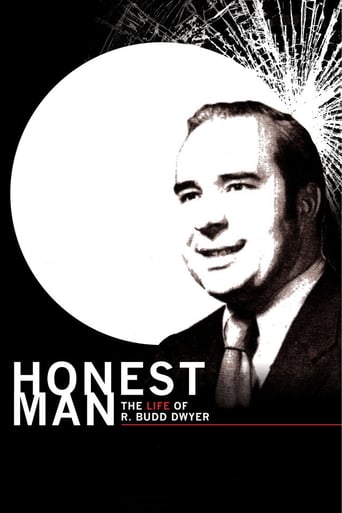Steve Pulaski
Every viral video or sensational clip that receives airplay or notoriety has a backstory, and Honest Man: The Life of R. Budd Dwyer is a documentary that works to add context to one of the most famous suicides ever captured on video. On January 22, 1987, Pennsylvania Treasurer R. Budd Dwyer, after being found guilty of accepting bribes from a Californian accounting firm, called a press conference before numerous officials and journalists. He was presumably going to announce his resignation, as his sentencing was scheduled to take place the next day. Following a four minute speech about his wife, kids, his innocence, and his legacy as Treasurer, Dwyer pulled a .357 revolver from a manila envelope, pointed it in his mouth, and shot himself, dropping dead instantly having broadcast his suicide to numerous Television stations.One of the most tragic things about Dwyer's case is that what he did, or allegedly did, while in office, is something that is more-or-less legal in state and federal government today. Accepting bribes, or "political donations," isn't uncommon and since the dawn of Citizens United, is something that special interest groups and lobbyists have been doing in excess. Honest Man works to tell Dwyer's side of the story, which has been shortchanged to the extreme act itself.Dwyer's wife, children, and colleagues all appear in the documentary and recount his life and the case that eventually engulfed his life. Dwyer studied political science and accounting in college, eventually running for the general assembly when he graduated. Roy Wilt, a colleague and a legislator, comments how politics was who Budd was and how it took over his life as soon as he began running for the assembly. He goes on to say how Budd would never look at the donators who graciously gave money to his campaign, nor could he ever bring himself to ask for money. While intelligent and crafty, he was extraordinarily humble, especially for a politician.Controversy began to plague his career once he became Pennsylvania's state Treasurer. When Dwyer wouldn't approve of state Governor Dick Thornburgh's wife's plane ticket as a business expenditure, he saw himself on the oust with the Governor. Right then and there, from the perspective of some, Dwyer seemed stubborn as a mule and somebody who was willing to fight over the smallest circumstances. Following this, Pennsylvania discovered that its state workers had grossly overpaid in their federal taxes because of the state withholding funds. This, in turn, led to dozens of accounting firms vying for a multimillion-dollar settlement contract in order to compensate each employee for the amount they overpaid. In 1986, Dwyer allegedly received a bribe from a California accounting firm that was trying to obtain the lofty contract, to which he plead not guilty to, wouldn't agree to a plea bargain, and stood trial in the case.The main witness to Dwyer's act of taking the bribe, William Smith, even admits to lying under oath in the documentary, saying Dwyer took the bribe during a false testimony. Smith admits here that he is, as a result, responsible for Dwyer's subsequent suicide.Dwyer's charisma and almost blue-collar, everyman charm is seen through each piece of archival footage shown in the documentary. He was a man of many commonalities, who in and of himself, didn't seem to have any interest in unethical dealings. During his famous final press conference, it was almost as if Dwyer couldn't believe he was in this situation; he seemed shocked, almost like a deer in headlights, as if he had no idea how he found himself in this situation and was more-or-less forced into it.The death of Dwyer is one of the most bizarre but saddening political tragedies I have yet to read of, and Honest Man does a solid job at detailing it. It's a case that found itself captured in a whirlwind of hearsay and miscalculation that led to the death of an arguably innocent man. Dwyer's surviving children explain in the film not only their reactions to their father's suicide at the time, but how, despite the suicide video's ubiquitous presence online, this kind of thing could happen again. Dwyer's widow, Joanne Dwyer, who died a year before the release of this film, nicely states how we live in a society obsessed with violence, and in this case, violence without much regard to context or history. Both her and her children state how the impact of Dwyer as a political figure and his legacy have, as a result, taken a backseat to the sensationalism and act of his suicide. They're not wrong, and it's depressing to see a story where a sympathetic, and quite possibly innocent, politician has fallen on deaf ears in present time.Directed by: James Dirschberger.
Mr-Fusion
Were it not for the infamous news footage of R. Budd Dwyer's public suicide, this man would certainly never have crossed my radar. That footage is all over the internet, and its enduring popularity is due mostly to shock at what our media will dare to show (a man blowing his brains out was actually televised in 1987). But it gives no indication or insight into the man at the center of the controversy. So from that standpoint, "Honest Man" is a welcome examination of the man, himself. And it is a surprisingly touching, discreet and (most importantly) informative documentary. To hear the interviewees tell it, Dwyer was a real man of the people, religiously devoted to his family and honest to a fault (perhaps naively). He really seems like a good guy, politician or not, and maintained his own brand of likability. I guess you could call this one-sided, or just a tribute ... but in the end, it's still far more than this country ever did know about him. But discretion only lasts so long here, and I was pretty disappointed that the movie included the incident. They did such a good job of portending what was coming, that they could've cut as soon as he raised the gun. The implication was all that was needed. But they decided to let us see the gunshot, and linger on his slumped (and bloodied) corpse. It's not graphic footage, so much as surprising, but in this case it is gratuitous. I wish they didn't show it. And hearing the TV producer's specious justification for airing the footage (equating it with our current sensationalist cable news) truly made me feel dirty for having sought out this footage on YouTube years ago, because there was a real human being who let the incident do the talking for his legacy. Dwyer mentions in the press conference that he hopes to be remembered for something else, other than the CTA scandal - and dark though this is, he got his wish. But I do feel that I've gotten a clearer picture about who R. Budd Dwyer was, and for that this documentary is a winner.7/10
elliot-63
Most of us watched this documentary for one reason, we saw Dwyer's suicide video and wanted to know what drove this man to do what he did. If I could sum Honest Man up in one word it would be poignant. At no time does the documentary try to sway you in his innocence or his guilt, which is the foundation of a good documentary, to present history without forcing you to believe what the documentarian believes. I think most of us are going to go into this with the outcome predetermined and we will see it the way we want to see it. I am not an emotional person but watching this documentary there were times that I felt something I'm not used to… sadness. Borrowed time, we are all on it, and Honest Man really shows us that not just Budd, and what went on in his life, but what could go on in any given day in ours. Many interviews in this documentary will stick with me. The only down side is there is very little of Budd himself talking. On the DVD there are a few swearing ins and a little bit of his final speech, in the extras, but what we learn of Budd comes from the memories of others and not his own words. Just to set the record straight the final speech was NOT aired live, it was rebroadcast. Who would care to watch the assumed resignation of a state treasurer live? Yes, kids were off of school that day but they did not see it live!

